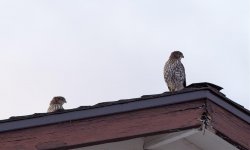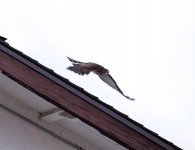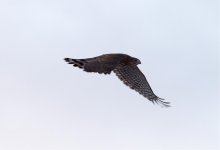Type of hawk? San Diego eastern suburbs (Southern California)
Hi,
New to this forum and excited to have found it. There has been one of these hanging out in our neighborhood for a few weeks now. Now there are two. They make a high-pitched screech which has our indoor cats fascinated. I'm assuming they are maybe Cooper's Hawks? But the pics I see on the internet look darker, and I'm a total n00b at this anyway. They are about the size of a crow or raven.
Thanks!
Hi,
New to this forum and excited to have found it. There has been one of these hanging out in our neighborhood for a few weeks now. Now there are two. They make a high-pitched screech which has our indoor cats fascinated. I'm assuming they are maybe Cooper's Hawks? But the pics I see on the internet look darker, and I'm a total n00b at this anyway. They are about the size of a crow or raven.
Thanks!
Attachments
Last edited:







